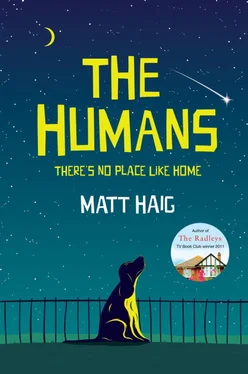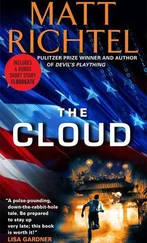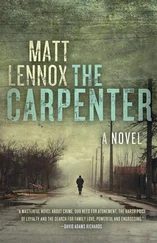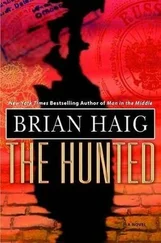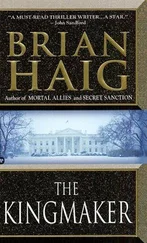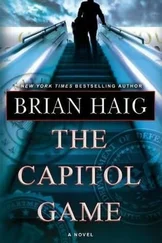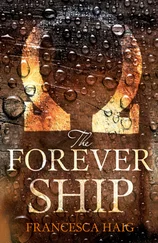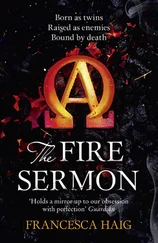Then I considered the glass. The glass had been distilled from rock and so it knew things. It knew the age of the universe because it was the universe.
I took another sip.
After the third sip, I was really beginning to see the point, and it did something rather pleasant to the brain. I was forgetting the dull aches of my body and the sharp worries of my mind. By the end of the third glass I was very, very drunk. I was so drunk I looked to the sky and believed I could see two moons.
‘You do realise you’re drinking Australian wine, don’t you?’ she said.
To which I may have replied ‘Oh.’
‘You hate Australian wine.’
‘Do I? Why?’ I said.
‘Because you’re a snob.’
‘What’s a snob?’
She laughed, looked at me sideways. ‘Someone who didn’t used to sit down with his family to watch TV,’ she said. ‘Ever.’
‘Oh.’
I drank some more. So did she. ‘Maybe I am becoming less of one,’ I said.
‘Anything is possible.’ She smiled. She was still exotic to me. That was obvious, but it was a pleasant exoticism now. Beyond pleasant, in fact.
‘Actually, anything is possible,’ I told her, but didn’t go into the maths.
She put her arm around me. I did not know the etiquette. Was this the moment I was meant to recite poetry written by dead people or was I meant to massage her anatomy? I did nothing. I just let her stroke my back as I stared upwards, beyond the thermosphere, and watched the two moons slide together and become one.
The next day I had a hangover.
I realised that if getting drunk was how people forgot they were mortal, then hangovers were how they remembered. I woke with a headache, a dry mouth, and a bad stomach. I left Isobel in bed and went downstairs for a glass of water, then I had a shower. I got dressed and went into the living room to read poetry.
I had the strange but real sense that I was being watched. The sense grew and grew. I stood up, went to the window. Outside the street was empty. The large, static redbrick houses just stood there, like decharged crafts on a landing strip. But still I stayed looking. I thought I could see something reflected in one of the windows, a shape beside a car. A human shape, maybe. My eyes might have been playing tricks. I was hungover, after all.
Newton pressed his nose into my knee. He released a curious high-pitched whine.
‘I don’t know,’ I said. I stared out of the glass again, away from reflections, to direct reality. And then I saw it. Dark, hovering just above that same parked car. I realised what it was. It was the top of a human head. I had been right. Someone was hiding from my stare.
‘Wait there,’ I told Newton. ‘Guard the house.’
I ran outside, across the drive and onto the street, just in time to see someone sprinting away around the next corner. A man, wearing jeans and a black top. Even from behind, and at a distance, the man struck me as familiar, but I couldn’t think where I had seen him.
I turned the corner, but there was no one there. It was just another empty suburban street, and a long one. Too long for the person to have run down. Well, it wasn’t quite empty. There was an old human female, walking towards me, dragging a shopping trolley. I stopped running.
‘Hello,’ she said, smiling. Her skin was creased with age, in the way typical of the species. (The best way to think of the ageing process in relation to a human face is to imagine a map of an area of innocent land which slowly becomes a city with many long and winding routes.)
I think she knew me. ‘Hello,’ I said back.
‘How are you now?’
I was looking around, trying to assess the possible escape routes. If they had slid down one of the passageways then they could have been anywhere. There were about two hundred obvious possibilities.
‘I’m, I’m fine,’ I said. ‘Fine.’
My eyes darted around but were unrewarded. Who was this man? I wondered. And where was he from?
Occasionally, in the days that followed, I would have that feeling again, of being watched. But I never caught a glimpse of my watcher, which was strange, and led me to only two possibilities. Either I was becoming too dull-witted and human, or the person I was looking for, the one who I could sometimes feel watching me in university corridors and in supermarkets, was too sharp-witted to be caught.
In other words: something not human.
I tried to convince myself that this was ridiculous. I was almost able to convince myself that my own mind was ridiculous, and that I had never actually been anything other than human. That I really was Professor Andrew Martin and that every other thing had been a kind of dream.
Yes, I could almost do that.
Almost.
That it will never come again,
Is what makes life so sweet.
– Emily Dickinson
Isobel was at her laptop, in the living room. An American friend of hers wrote a blog about ancient history and Isobel was contributing a comment about an article on Mesopotamia. I watched her, mesmerised.
The Earth’s moon was a dead place, with no atmosphere.
It had no way of healing its scars. Not like Earth, or its inhabitants. I was amazed, the way time mended things so quickly on this planet.
I looked at Isobel and I saw a miracle. It was ridiculous, I know. But a human, in its own small way, was a kind of miraculous achievement, in mathematical terms.
For a start, it wasn’t very likely that Isobel’s mother and father would have met. And even if they had met the chances of their having a baby would have been pretty slim, given the numerous agonies surrounding the human dating process.
Her mother would have had about a hundred thousand eggs ovulating inside her, and her father would have had five trillion sperm during that same length of time. But even then, even that one in five hundred million million million chance of existing was a terrible understatement, and nowhere near did the coincidence of a human life justice.
You see, when you looked at a human’s face, you had to comprehend the luck that brought that person there. Isobel Martin had a total of 150,000 generations before her, and that only includes the humans. That was 150,000 increasingly unlikely copulations resulting in increasingly unlikely children. That was a one in quadrillion chance multiplied by another quadrillion for every generation.
Or around twenty thousand times more than the number of the atoms in the universe. But even that was only the start of it, because humans had only been around for three million Earth years, certainly a very short time compared to the three and a half billion years since life first appeared on this planet.
Therefore, mathematically, rounding things up, there was no chance at all that Isobel Martin could have existed. A zero in tento-the-power-of-forever chance. And yet there she was, in front of me, and I was quite taken aback by it all; I really was. Suddenly it made me realise why religion was such a big thing around here. Because, yes, sure, God could not exist. But then neither could humans. So, if they believed in themselves – the logic must go – why not believe in something that was only a fraction more unlikely?
I don’t know how long I looked at her like this.
‘What’s going through your mind?’ she asked me, closing the laptop. (This is an important detail. Remember: she closed the laptop.)
‘Oh, just things.’
‘Tell me.’
‘Well, I’m thinking about how life is so miraculous none of it really deserves the title “reality”.’
‘Andrew, I’m a little taken aback about how your whole worldview has become so romantic.’
Читать дальше
